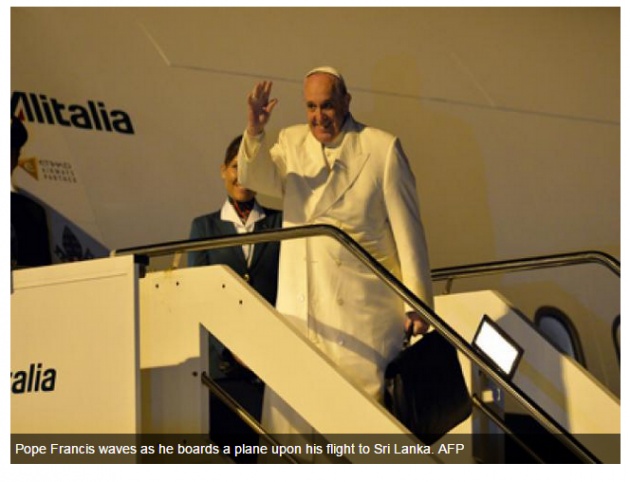
Pope Francis will arrive in Sri Lanka on Tuesday, days after the surprise election of a president who has pledged a new culture of tolerance in a country still recovering from civil war.
The pope's second visit to Asia will also take in the Philippines, a bastian of Christianity in the region, where he is expected to attract one of the biggest gatherings ever for a head of the Catholic church.
In mainly Buddhist Sri Lanka, he is expected to focus on postwar reconciliation and interfaith harmony after a period of rising religious violence.
Only around six percent of the country's 20 million people is Catholic, but the religion is seen as a unifying force because it includes people from both the majority Sinhalese and minority Tamil ethnic groups.
The Pope will be greeted by Sri Lanka's new President Maithripala Sirisena, who has pledged to protect religious freedoms, before meeting Buddhist, Hindu and Muslim leaders in Colombo.
On Wednesday, he will hold a public mass on the seafront that is expected to attract around a million people during which he will canonise Sri Lanka's first saint, a 17th Century missionary.
He will also visit a small church in the jungle that was on the front line of the conflict between government troops and separatist Tamil rebels that killed around 100,000 people and and only ended five years ago.
The Our Lady of Madhu church in the mainly Tamil north of the country provided sanctuary during the fighting, and is now a pilgrimage destination for Christians from across the ethnic divide.
Special interest in Asia
The pope's trip comes just five months after he visited South Korea, signalling the huge importance the Vatican places on Asia and its potential for more followers.
The region holds a special interest for Pope Francis, who as a young priest considered becoming a missionary in Japan.
On Thursday he will fly on to the Philippines, where anticipation has been building for months, with the pope dominating the media and sparking a merchandise frenzy.
The Philippines is one of the Church's modern success stories, counting roughly 80 percent of the former Spanish colony's 100 million people as Catholics, which has helped to offset waning influence in Europe and the United States.
He will meet survivors of Super Typhoon Haiyan, which claimed 7,350 lives when it destroyed entire farming and fishing communities in 2013.
The pope will give a mass to tens of thousands of survivors at the airport in Tacloban, one of the worst-hit cities.
Security will be a major issue throughout the pontiff's Asia trip.
In Sri Lanka religious violence has risen in recent years, with attacks on mosques and some churches by nationalist Buddhist groups who say minorities have undue influence on the island.
The army said troops had been placed on stand by, although police will be taking the lead in a country where a military presence remains sensitive.
Emergency medical units were being placed along the route from the airport to the city centre, which is expected to be lined with well-wishers.
Francis is the first pope to visit the country since John Paul II two decades ago. Buddhist monks boycotted his visit over controversial remarks John Paul made in his book "Crossing the Threshold of Hope".



